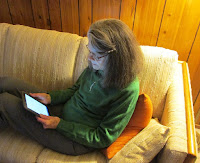For any reader, aging presents an extremely painful problem. My mother, a reading specialist and reading devotee with an extensive personal library, lived to the age of 101; after about 95 years, she found it hard to continue reading her beloved books. The print was too small, there was too little contrast with the paper, and so on. By the time she died, she could read almost nothing.
Fortunately,
some helpful options are available. Listening to audiobooks is helpful for many
people, whether they have poor vision or not. Indeed, audiobooks can be very
pleasing when the reader is skilled. For instance, I especially enjoy hearing books
written by the late mystery writer Dick Francis if they are read by Simon
Prebble, whose voice is exactly right for Francis’s books. The main drawback to
audiobooks is that you can’t go back to an earlier point (unless by a method I
haven’t discovered) to look up something. They are invaluable for anyone who
has lost their vision completely, and have been around since 1948 as a service
of Recording for the Blind (now renamed Recording for the Blind and
Dyslexic/Learning Ally).
Large-print
books have long been available, too. In the past I found them limited to
religious novels and other books someone decided were appealing to the elderly,
but recently I have seen many that are suited to a wider audience. If a book
you want to read is available in a large-print edition, it’s another good choice.
For a long
time I resisted the Kindle electronic reader, being a snob about reading. Yes,
the Kindle is inferior to a large library of “real books.” As my vision has
declined, though, I find it harder and harder to read those. With a Kindle
edition, I can adjust the font, the type size, the background color and
brightness for maximum readability. Recently I read Melville’s Billy Budd
on the Kindle after finding the library’s standard book impossible. For traveling,
the Kindle can hold hundreds of books in a tiny space. The savvy reader can add
notes, bookmarks, and so on, too. I’ve had some problems with using those, but
I love the built-in dictionary.
The Kindle
has its downsides: It’s hard to flip
through the “pages,” though searching for a character’s or place’s name
sometimes makes it possible. It’s hard also to form a sentimental attachment to
an electronic book; I can’t imagine giving one to a child. Compared with free
books from a public library, Kindle books can get expensive. (Many books can be
downloaded free from Gutenberg.org, though, and Amazon often offers free or
inexpensive books.)
All in all,
I’m lucky to have some alternatives to “real” books. I may miss the real thing,
but at least I can still read a book’s contents.
Copyright © Decembert 20, 2021 by Carol Leth Stone (a.k.a. RovinCrone)

